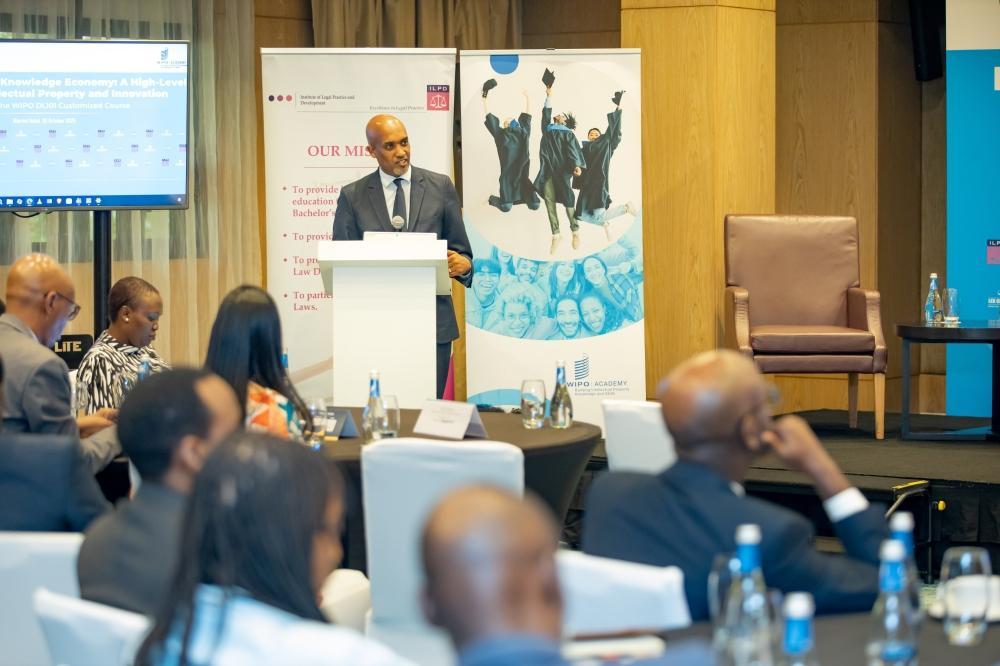Africa-Press – Rwanda. Rwanda has become the first country in Sub-Saharan Africa to introduce a customized Intellectual Property (IP) course, developed through a partnership between the Institute of Legal Practice and Development (ILPD) and the World Intellectual Property Organization (WIPO).
This comes just over a year after Rwanda passed an IP law.
The course, officially launched on October 30, known as DL101ERW, is designed to build a deeper understanding of intellectual property and its role in driving innovation, creativity, and sustainable development, particularly within the Rwandan context.
According to Aime Karimunda Muyoboke, the Rector of ILPD, the course responds to a critical gap in IP awareness.
“Many creators don’t know their rights, and even legal professionals sometimes lack the tools to interpret IP laws. Courts also face challenges due to the limited number of judges specialized in IP,” he said.
“This course will help bridge those gaps by training more people to understand and protect intellectual property.”
Muyoboke emphasized that the course is not limited to lawyers or legal professionals. It is open to artists, entrepreneurs, researchers, policymakers, and anyone interested in learning how to safeguard intellectual property.
“Now that our country’s vision is anchored in a knowledge-based economy, it is vital to protect the intellectual output of Rwandans, both locally and globally,” he added.
The nine-week online programme, which requires approximately 77 hours of study, offers an overview of IP law with a focus on Rwandan legislation and practice. It includes self-assessment tools, case studies, and interactive discussions. Registration for the programme is open and will close on December 1.
The curriculum covers key areas such as copyright, patents, trademarks, industrial designs, and geographical indications, as well as Rwanda’s integration into international IP frameworks administered by WIPO.
Dr Thomas Muyombano, the singer popularly known as Tom Close, hailed the initiative as a development for the creative industry.
“The gap in IP knowledge among artists has been huge,” he said. “Many don’t know how to protect their compositions or creative works. This course comes at the right time. It’s part of the solution and a foundation for better protection of artistic and innovative efforts.”
He added that as more Rwandans gain IP knowledge, artists and innovators would be better positioned to earn from their creations.
“Creating music or content takes financial investment. Protecting it ensures that creators can sustain themselves from their work,” he noted.
Altaye Tedla, Director of the WIPO Academy, described the course as a “training tool for Rwanda, by Rwanda.” She highlighted the importance of customizing global IP education to local realities.
“This is the first time a Sub-Saharan African country has developed its own version of a WIPO course. It shows Rwanda’s leadership in linking education, innovation, and technology,” she said.
“IP education empowers youth and women to move from imagination to market, turning ideas into opportunities.”
She also emphasized that digital learning tools will help expand access to IP education beyond urban areas, breaking barriers of geography and connectivity.
Emmanuel Ugirashebuja, the Minister of Justice who delivered a keynote speech at the launch, underscored Rwanda’s growing commitment to strengthening its IP framework as part of national development.
“Rwanda’s journey in intellectual property has evolved from outdated colonial laws to a modern, forward-looking legal system,” Ugirashebuja said.
“Our latest IP law, enacted in 2024, aligns with global standards and supports our Vision 2050 goal of becoming a knowledge-driven economy.”
He noted that IP protection is essential for Rwanda’s transformation into an innovation hub.
“Startups, artists, and inventors thrive when they can safeguard their ideas. IP gives them the confidence to invest, attract financing, and compete globally,” he said.
Ugirashebuja added that the new course would make IP education more practical and inclusive by integrating real-world examples and encouraging dialogue between lawyers, innovators, and entrepreneurs.
“We must demystify IP. It is not just for big corporations, it’s for everyone with a creative spark,” he said. “This course gives Rwandans the tools to turn ideas into assets.”
For More News And Analysis About Rwanda Follow Africa-Press






